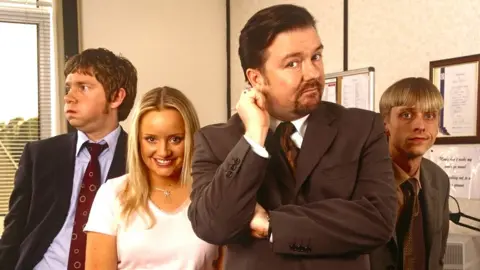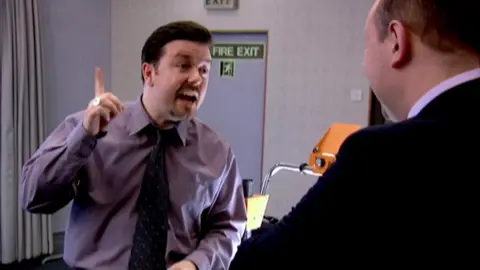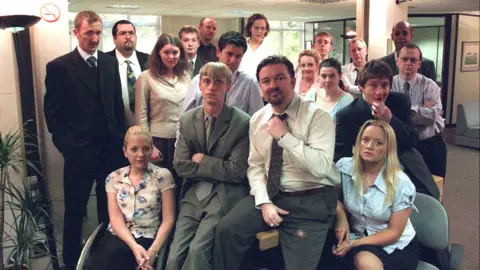Ricky Gervais: 'The Office would be cancelled now'
On the 20th anniversary of The Office, its star and co-creator Ricky Gervais looks back on the success of the comedy show and considers whether viewers still connect with it today.
"I didn't have huge ambitions, it was never, 'This is going to be a massive hit,'" says Gervais of the fly-on-the-wall mockumentary, in which he starred as the excruciating boss David Brent at a fictional paper merchants in Slough.
And it wasn't at first. The Office premiered on BBC Two at 21:30 on 9 July - a Monday night in the summer of 2001.
Series one had the lowest audience appreciation of any new BBC Two show that year, producer Jon Plowman said in 2015.
"Ratings were rotten too," he recalled. But when it was shown again a couple of months later it doubled its figures.
Gervais says he and his co-writer and director Stephen Merchant were given what was a "good, standard budget at the time" of £140,000 an episode.
And so, in single-camera style, the show zoomed in on the lives of redundancy-threatened staff at the company Wernham Hogg.
"I think the first series got about 1.5 million viewers. And I was happy with that," says Gervais. "And then they repeated it, and it got 2.5 million. So that said something. Then I started to get conscious of the wave, the turn."
The exploits of the unbearable Brent and his long-suffering staff had wormed their way into the national consciousness and the show started to become a cult hit.
The depiction of office life

Those who watched the show the first time around may not have seen an episode since - but many would still be able to rattle off the chorus to Free Love Freeway, painfully performed by Brent in one episode, or imitate his infamous dance from another.
Dr Simon Weaver, a senior lecturer in media and communications at Brunel University in London, says the show struck a chord because people identified with the experience of working in an office at the time.
"Through the character Tim (played by Martin Freeman), The Office captures the mundanities of modern work and the ways in which employment structures operate, slowly but surely, to strip away the dreams and aspirations of workers," he says.
"David Brent is the quintessential authority figure for contemporary society. His abuses are micro-aggressions, unconscious biases and ignorance.
"His move into a celebrity lifestyle demonstrates the pitfalls of one of the exit routes out of the iron cage of office life. Before austerity, populism and pandemics, The Office captured the zeitgeist of late 20th Century prosperity."
Gervais says he is aware of feelings of nostalgia among many of those who grew up with The Office.
"At the moment, I think it's big amongst the people who loved it when they were 13, 14 or 15," he says.
"So I think for every 35 to 40 year-old, it's in their parlance. People tell me husbands and wives talk to each other like they were in The Office."
The magic of characterisation and casting

Gervais says the characters in The Office were "Frankensteins" of people he knew growing up and during casting he found actors that made them "even funnier".
Gareth (played by Mackenzie Crook) was based on a boy Gervais was at school with when he was 14.
"He was sort of like a sporty, rugger sort of guy who fantasised about getting into the army," he says.
"So I was looking for someone who looked like they could get in the SAS. And then Mackenzie Crook walked in, and it was even funnier because now it was a guy who weighed about seven stone and looked like a baby bird, talking about killing a man."
Gervais had based Tim on someone he knew as "a bit of a slob".
"But then Martin came in and did it with much more verve and affection," he says.
"Some people thought The Office was ad-libbed, and that's a testament to the actors, making it look like they came up with it off the top of their heads."
Dawn and Tim's love story

The antidote to Brent's desperate behaviour came from Tim and Dawn (played by Lucy Davis), the stars of the will-they-won't-they love story that runs through the series.
"Tim and Dawn make it grounded," says Gervais. "They make it matter."
When they finally kissed in the last episode, theirs became the greatest TV love story of our time.
So would they still be together? Gervais says he hasn't thought about it but adds: "They could be married with five kids but what does that mean?
"We don't know how good that is. That might be terrible. The best thing to say is that they're happy. They're fine."
It still works because it's done and dusted

But that's not his favourite episode, says Gervais. That accolade goes to episode four of series one, entitled Training.
"So much came from that episode. A lot happens. Tim blurts out his love for Dawn, and he can't take it back and now everyone knows. Brent goes ballistic to be the centre of attention: he gets the guitar out and Free Love Freeway came out of it," he says.
After two series, two Christmas specials, and the spin-off film Life On The Road, the world has still only seen about 14 hours of Brent.
When asked previously if he would ever bring him back, Gervais said he thought it would "be too sad to see David Brent pratting around at 60".
"It would just be too tragic, we won't be able to laugh any more."
And today he sticks by it: "I think to try and assemble The Office again would be shameful. Why would they be there? It wouldn't be pleasant to watch. I wouldn't wish that on anyone. It works because it's done."
But is a good idea good forever?

It might be done but does the Office really have the same appeal 20 years on?
Gervais doesn't think the show has become dated. "The themes are universal: good and bad bosses, doing a decent job, boy meets girl, wanting to be loved," he says.
Guardian TV Critic Lucy Mangan says: "I think it will endure because it's an exquisitely-worked, absolute masterpiece.
"It captures not just everything about working in an office, but eternal archetypes in the characters and the whole feeling of the long littleness of life. And none of that will ever change.
"I think it will probably age very well because it's so very and deliberately unextreme. It's working with a very small palette, capturing essences, which tends to future proof things better than other approaches."
But Simon Weaver says the show might struggle to inspire a lot of people today and in the future because the world has changed.
"The comedy works as a reflection on a period of prosperity, between the Cold War and the war on terror, and long before austerity," he says.
"This is a situation where people are comfortable yet much of day-to-day life is still miserable and grey. There's a good chance that it's not going to be particularly relevant for people struggling on universal credit or furlough."
Would the show fall victim to 'cancel culture'?

Now there is also the issue of greater political correctness to consider, says Gervais.
"I mean now it would be cancelled. I'm looking forward to when they pick out one thing and try to cancel it. Someone said they might try to cancel it one day, and I say, 'Good let them cancel it. I've been paid!'"
Gervais has since tweeted that he was joking about the show being cancelled, adding his comment was "clearly a joke".
But because the sexist or racist jokes Brent came out with made him the butt of the joke The Office is not likely to be targeted by cancel culture, says Weaver.
"I doubt that The Office will be criticised in the same way that, for example, Little Britain has been," he says.
"In The Office, the audience are encouraged to identify not with the ignorant Brent, but with the characters Dawn and Tim, and the victims of Brent's ill-conceived comments are never racial or gendered caricatures, rather they are ordinary, intelligent people.
"The comedy clearly highlights the ignorance of the bigot in a way that Till Death Us Do Part and others failed to do."
Measures of success
The Office was named the best TV show of the past 20 years at the Broadcast Awards in 2015. It's won two Golden Globes and a host of Baftas and Royal Television Society Awards.
It has also been syndicated in more than 80 countries and a number of these bought into the franchise and made their own versions.
Unquestionably the most successful of these was in the US, where Steve Carell starred as Michael Scott, the equally excruciating boss of Dunder Mifflin Paper Company in Scranton, Pennsylvania.
Gervais and Merchant wrote the first season, released in 2005, before the show took on an identity of its own, producing more than 200 episodes and winning five Emmys.
What does Gervais consider his proudest moments from having created The Office?
"I'm probably proudest of the first bit of acting I did when he [David Brent] begs for his job back," he says.
"And I think I'm most proud of the bits that people send me now every day on Twitter. You know, it's amazing that it made a connection with people, and it means something to them."
